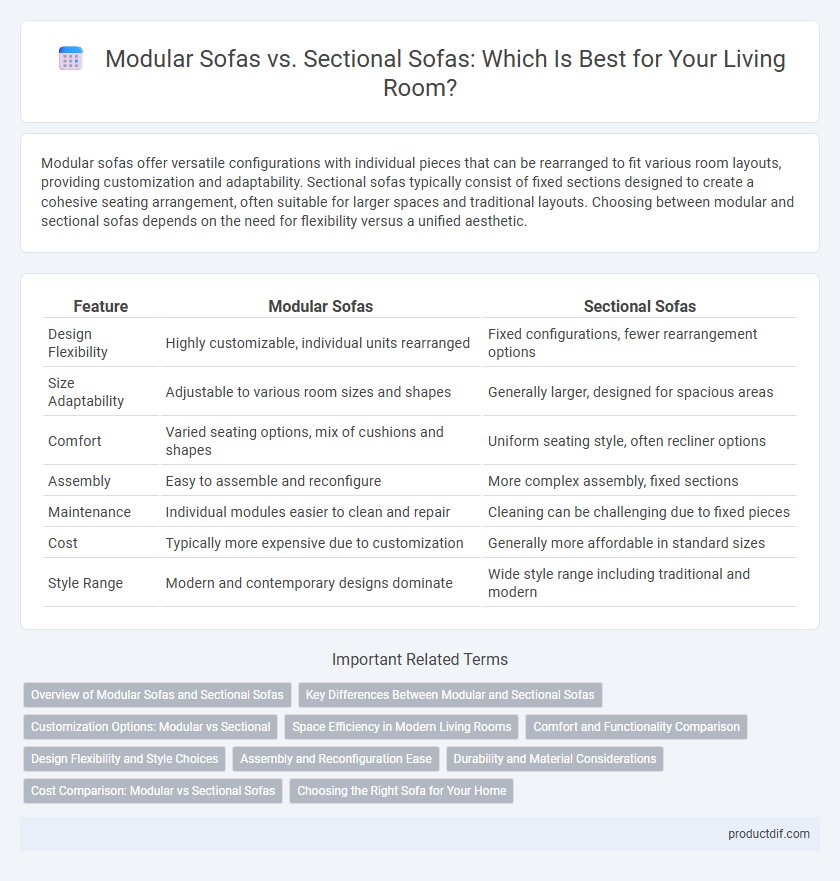Modular sofas offer versatile configurations with individual pieces that can be rearranged to fit various room layouts, providing customization and adaptability. Sectional sofas typically consist of fixed sections designed to create a cohesive seating arrangement, often suitable for larger spaces and traditional layouts. Choosing between modular and sectional sofas depends on the need for flexibility versus a unified aesthetic.
Table of Comparison
| Feature | Modular Sofas | Sectional Sofas |
|---|---|---|
| Design Flexibility | Highly customizable, individual units rearranged | Fixed configurations, fewer rearrangement options |
| Size Adaptability | Adjustable to various room sizes and shapes | Generally larger, designed for spacious areas |
| Comfort | Varied seating options, mix of cushions and shapes | Uniform seating style, often recliner options |
| Assembly | Easy to assemble and reconfigure | More complex assembly, fixed sections |
| Maintenance | Individual modules easier to clean and repair | Cleaning can be challenging due to fixed pieces |
| Cost | Typically more expensive due to customization | Generally more affordable in standard sizes |
| Style Range | Modern and contemporary designs dominate | Wide style range including traditional and modern |
Overview of Modular Sofas and Sectional Sofas
Modular sofas consist of individual pieces that can be rearranged or added to create customized seating configurations, offering flexibility and adaptability for various living spaces. Sectional sofas are typically fixed in specific arrangements, often including a combination of sofas and chaise lounges designed to fit together seamlessly. Both options provide versatile seating solutions, with modular sofas excelling in personalization and sectional sofas emphasizing cohesive design.
Key Differences Between Modular and Sectional Sofas
Modular sofas consist of individual, movable pieces that can be rearranged to suit different spaces and preferences, offering customizable versatility. Sectional sofas are typically fixed configurations made up of connected sections designed to fit specific room layouts with less flexibility. The key difference lies in modular sofas providing more adaptability for evolving interior design needs, while sectional sofas deliver a cohesive, space-efficient seating solution.
Customization Options: Modular vs Sectional
Modular sofas offer unparalleled customization options, allowing users to rearrange individual pieces to fit various room sizes and shapes, creating a truly personalized seating arrangement. Sectional sofas come in predefined configurations with limited flexibility, typically designed as L-shaped or U-shaped units that suit standard living spaces. The modular design caters to evolving needs, making it ideal for those seeking adaptability and bespoke comfort in their furniture.
Space Efficiency in Modern Living Rooms
Modular sofas offer unparalleled space efficiency in modern living rooms by allowing customizable configurations that adapt to various room sizes and layouts. Sectional sofas provide fixed arrangements, which can maximize seating but may limit flexibility in tight spaces. Choosing modular sofas enhances functionality by optimizing available space without compromising style or comfort.
Comfort and Functionality Comparison
Modular sofas offer superior customization with individual pieces that can be rearranged for personalized comfort and adaptability to different room layouts. Sectional sofas provide a cohesive seating experience, often featuring fixed configurations that maximize space and support a consistent lounging posture. Both options deliver high comfort and functionality, but modular designs excel in versatility while sectionals typically offer more structural stability.
Design Flexibility and Style Choices
Modular sofas offer unparalleled design flexibility by allowing users to rearrange individual pieces to fit different room layouts and styles, making them ideal for dynamic living spaces. Sectional sofas typically come in fixed configurations, providing stylish yet limited arrangement options that suit traditional or contemporary decor. Both options deliver diverse fabric and color choices, but modular designs enable easier customization and adaptability to evolving interior trends.
Assembly and Reconfiguration Ease
Modular sofas feature individual, lightweight pieces that simplify assembly and enable effortless reconfiguration to fit various room layouts or needs. Sectional sofas often come as larger, fixed components requiring more time and tools for assembly, limiting flexibility in rearrangement. The modular design's adaptability makes it ideal for users seeking customizable seating with minimal effort.
Durability and Material Considerations
Modular sofas offer superior durability with high-quality, individual components that can be replaced or upgraded over time, often featuring robust hardwood frames and performance fabrics resistant to wear. Sectional sofas typically use one continuous frame and may have uniform fabric, which can be less flexible in repairs but often include dense foam cushions and durable upholstery suited for heavy use. Both options benefit from materials like leather or microfiber, but modular designs provide enhanced longevity through customizable and replaceable parts.
Cost Comparison: Modular vs Sectional Sofas
Modular sofas typically offer a more cost-effective solution due to their customizable nature, allowing buyers to purchase only the desired number of pieces, whereas sectional sofas often come as a single unit with less flexibility in pricing. Sectional sofas tend to have higher upfront costs because of their larger, fixed configurations and premium materials commonly used in their construction. Consumers seeking budget-friendly options often prefer modular sofas since they provide versatility without the premium cost associated with traditional sectionals.
Choosing the Right Sofa for Your Home
Modular sofas offer flexible configurations that adapt to changing spaces, ideal for small or irregular rooms, while sectional sofas provide a more fixed, cohesive design suited for larger living areas. Consider factors like room size, lifestyle needs, and aesthetic preferences to determine which sofa type enhances comfort and functionality in your home. Prioritizing customization and space optimization ensures the chosen sofa complements both your interior design and daily use.
Modular sofas vs Sectional sofas Infographic

 productdif.com
productdif.com